Advertisement for the Chicago Orchestra's first performance of Handel's Messiah with the Apollo Musical Club in December 1891
Chicago Tribune
To close its seventh season on June 5, 1879, the Apollo Musical Club began its annual tradition of presenting Handel’s Messiah, under the baton of the ensemble’s second director, William L. Tomlins, in McCormick Hall. To celebrate the opening of Dankmar Adler and Louis Sullivan’s Auditorium Theatre on December 9, 1889, Tomlins led the Club in the “Hallellujah” chorus, and, later that month, presented the complete oratorio in the new hall. And two years later, the Chicago Orchestra spent its first Christmas holiday sharing the stage with the Apollo, collaborating in Messiah at the Auditorium.
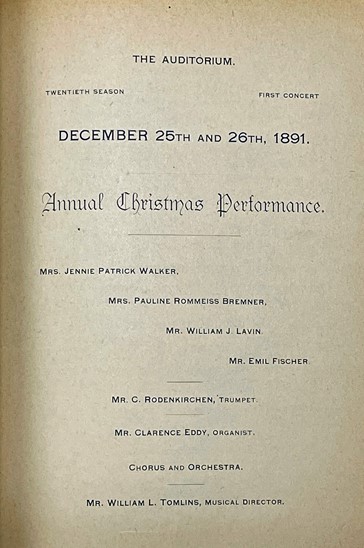 “Every seat in the Auditorium was taken” for that first performance — opening the Apollo Musical Club’s twentieth season — given on Christmas Day 1891, according to the Chicago Tribune. “Every part of the choral singing last evening merited highest praise for the excellence of the body of tone, the fine balance of the different parts, the firmness, unity, and confidence in attack, and the spirit and artistic intelligence shown in the rendition of the various choruses.” The reviewer also praised the “capable orchestra. Some fifty-four members of the Chicago Orchestra played the accompaniments last evening, and delightfully indeed [and] one member of the orchestra merits special mention. Mr. [Christian] Rodenkirchen [the Orchestra’s first principal trumpet] played the music for the solo trumpet in the air ‘The trumpet shall sound,’ and played it faultlessly, a performance not experienced in this city in years.”
“Every seat in the Auditorium was taken” for that first performance — opening the Apollo Musical Club’s twentieth season — given on Christmas Day 1891, according to the Chicago Tribune. “Every part of the choral singing last evening merited highest praise for the excellence of the body of tone, the fine balance of the different parts, the firmness, unity, and confidence in attack, and the spirit and artistic intelligence shown in the rendition of the various choruses.” The reviewer also praised the “capable orchestra. Some fifty-four members of the Chicago Orchestra played the accompaniments last evening, and delightfully indeed [and] one member of the orchestra merits special mention. Mr. [Christian] Rodenkirchen [the Orchestra’s first principal trumpet] played the music for the solo trumpet in the air ‘The trumpet shall sound,’ and played it faultlessly, a performance not experienced in this city in years.”
The reviewer also noted the “marvelous” podium leadership of William L. Tomlins (1844–1930), who had led the Apollo Musical Club since its third season beginning in 1875. “His conception of the masterpiece is an inspiration, and his success in impressing his conceptions upon the chorus is only equaled by the latter’s ability to express them to the audiences. I do not believe it possible for any body of singers to first catch and then convey the full significance of every word . . . better than the Apollo chorus.”
The program was repeated the following evening for “wage workers . . . young men who measure out goods behind dry goods counters and daintily gloved fingers that daily touch the keys of the typewriters.” Again, the Apollo, “acquitted itself with even more credit [with] smoothness of tone and firmness in the rendition of parts.”
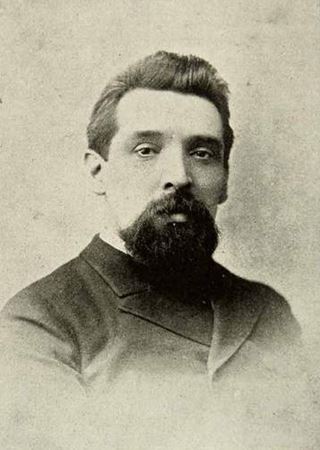
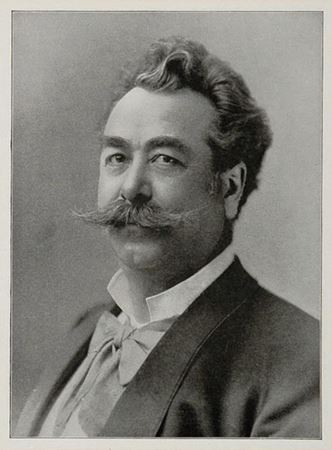
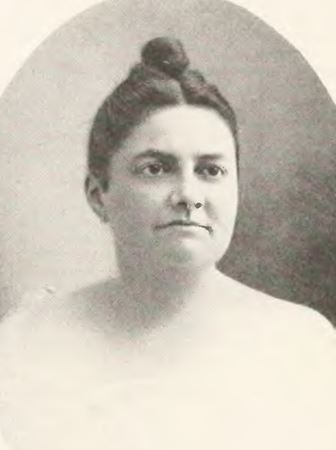
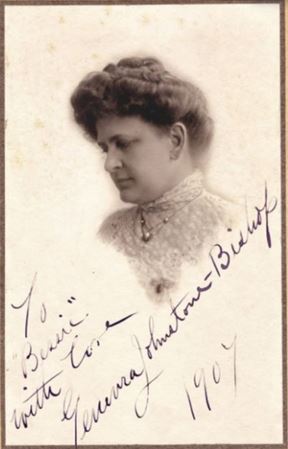
German bass Emil Fischer (1838–1914) was in town to perform with the Chicago Orchestra during the fourth week of subscription concerts on December 18 and 19. Under founder and first music director Theodore Thomas’s baton, Fischer sang Schubert’s Der Wanderer and Ständchen (both orchestrated by Thomas, the latter performed as an encore) along with Hans Sachs’s monologue from the third act of Wagner’s Die Meistersinger von Nürnberg. A regular at the Metropolitan Opera from 1885 until 1891, Fischer appeared with the company in New York in the U.S. premieres of Wagner’s Götterdämmerung, Die Meistersinger von Nürnberg, Das Rheingold, Rienzi, Siegfried, Tannhäuser (Paris version), and Tristan and Isolde, along with Weber’s Euryanthe. Fischer also would later perform with the Orchestra, under both Thomas and Tomlins, in several concerts during the World’s Columbian Exposition in 1893.
American singers rounded out the rest of the cast of soloists. Soprano Jennie Patrick Walker (1856–1930) performed on December 25 but canceled due to illness for the second performance. She was replaced by soprano Genevra Johnstone Bishop (ca. 1860–1924), who later performed with the Chicago Orchestra on a number of occasions on tour, subscription concerts, and at the World’s Columbian Exposition. She also served as musical adviser at the White House during President Warren G. Harding’s term.
Contralto Pauline Rommeiss Bremner (1859–1936) and tenor William J. Lavin (1856–1900, the first husband of soprano Mary Howe-Lavin) completed the cast.
For more than seventy years, the Orchestra continued to regularly collaborate with the Apollo in Handel’s Messiah, with performances at the Auditorium, at the World’s Columbian Exposition, and in Orchestra Hall, most recently on December 15, 1964.
The Chicago Symphony Orchestra and Chorus (prepared by guest chorus director James K. Bass) will present Handel’s Messiah on December 21, 22, and 23, 2023, in Orchestra Hall with soloists Joélle Harvey, Jennifer Johnson Cano, Matthew Polenzani and John Relyea. Sir Andrew Davis conducts.
This article also appears here.



